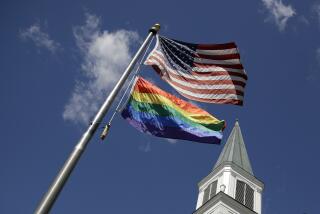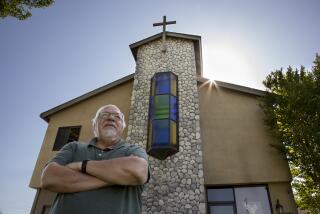Methodist Panel on Homosexuality Concerned on How Work Is Viewed
- Share via
DENVER — Members of a committee studying homosexuality for the United Methodist Church over the next three years are concerned about how their work is being viewed in the denomination, as well as what their report will say.
This concern was expressed repeatedly during the committee’s recent meeting here.
Committee members “have a real understanding that the issue is difficult and sensitive,” said C. David Lundquist, a committee member and top staff person of the church’s General Council on Ministries.
Some church members who believe that the Bible is clearly against homosexuality have complained that there is no need to study the issue. Committee members referred several times to “angry letters” they have received from members of the church.
‘Quite Unrealistic’
“To dwell on Scripture alone . . . is quite unrealistic,” said committee member James C. Logan, professor of systematic theology at Wesley Theological Seminary in Washington.
The committee was created last year by the denomination to study homosexuality from theological, ethical and scientific perspectives. The committee’s report is due in 1992 to the next General Conference.
The church’s official position says the practice of homosexuality “is incompatible with Christian teaching.” The church bans the ordination of “self-avowed practicing homosexuals.”
The committee heard preliminary reports on medical, psychological, sociological and theological aspects of the issue they will be studying throughout the three-year period. Leaders from a Denver group, Where Grace Abounds, which helps persons who are dissatisfied with their homosexuality, addressed the committee.
Open Minds Urged
Logan and others insisted that it is important for committee members to show that they are willing to consider many viewpoints.
Several members said they will present the group with information contrary to the anti-homosexual beliefs of many church members.
In one presentation, a New Testament professor, Victor Paul Furnish of Perkins School of Theology in Dallas, told committee colleagues that the Bible says nothing about homosexuality. Biblical references often associated with homosexuality refer to some homosexual practices rather than a life style, he explained.
The term “homosexuality” was first used in 1869, he said.
Traditional Values
Other committee members criticized some contemporary Christian leaders who they say promote traditional family values that denigrate single persons and gay couples.
In response, committee member J. Philip Wogaman, ethics professor at Wesley Theological Seminary, said the committee does not want its work “perceived as adversarial to the family.”
More to Read
Sign up for Essential California
The most important California stories and recommendations in your inbox every morning.
You may occasionally receive promotional content from the Los Angeles Times.










